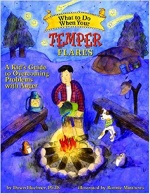Teaching Children Healthy Anger Management
May 25, 2019
Quote of the Week
"The truth about rage is that it only dissolves when it is really heard and understood, without reservation." -- Carl Rogers
Teaching Children Healthy Anger Management
 All kids -- like all humans -- get angry. When we feel threatened, we move into fight, flight or freeze. Anger is the body's "fight" response. [...] Humans mobilize against any perceived threat (even our own upset feelings) by attacking.
All kids -- like all humans -- get angry. When we feel threatened, we move into fight, flight or freeze. Anger is the body's "fight" response. [...] Humans mobilize against any perceived threat (even our own upset feelings) by attacking.
That's true for kids as well, of course. And because kids don't have a context for their upsets, a small disappointment can seem like the end of the world. Worse yet, since they don't have a fully developed frontal cortex to help them self-regulate, children are even more prone to lashing out when they're angry. (Doesn't it seem crazy that we expect them to handle anger constructively, when so often we adults don't?)
Sometimes attacking makes sense when we're angry, but only when there's actually a threat. That's rare. Most of the time when kids get angry, they want to attack their little brother (who broke their treasured memento), their parents (who disciplined them "unfairly"), their teacher (who embarrassed them) or the playground bully (who scared them.) Luckily, as children's brains develop, they gain the capacity to manage their anger constructively -- IF they live in a home where anger is handled in a healthy way. [read more]
Reading Corner
 Title: What to Do When Your Temper Flares: A Kid's Guide to Overcoming Problems with Anger
Title: What to Do When Your Temper Flares: A Kid's Guide to Overcoming Problems with Anger
By: Dawn Huebner
Ages: 6-12
Why? "As any parent raising a child with intense emotions knows, it's extraordinarily difficult attempting to help your child contain their huge, oftentimes destructive feelings. What I love about this book is it does a fantastic job of not just offering coping skills, but clarifying that anger is a choice and it is a choice that has consequences. [...] There are tons of books out there offering coping skills, mindfulness techniques, etc, but this is the first I've found that focuses on thoughts and behaviors in a simple, comprehensible way. Training my kiddo in calming techniques, like taking ten deep breaths hasn't helped that much, but she seems to respond well to the idea that she is in control of her responses. Perhaps it has something to do with the element of control...anger is often a bid to feel powerful in a difficult situation. The element of choice -- "how will I respond to this difficulty?" -- is one way to apprise control, though in a positive way." - Publisher
Be the Change
If you find yourself faced with anger outbursts regularly, take a look at these preventative maintenance habits, which may help you to meet your child's needs before their unmet needs lead them to breakdown.





